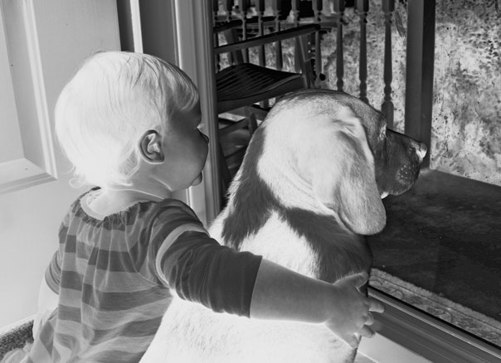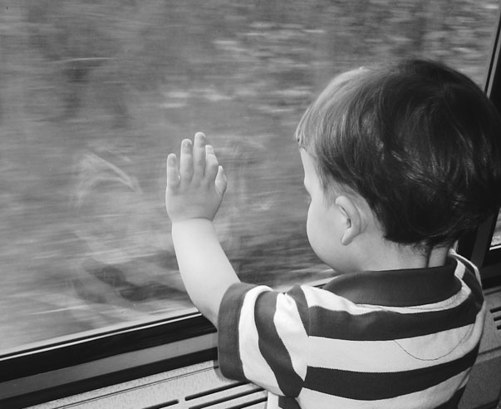The No-Cry Separation Anxiety Solution: Gentle Ways to Make Good-bye Easy from Six Months to Six Years (25 page)
Authors: Elizabeth Pantley
Tags: #0071596909

do schedule regular and consistent playtime. Young children can
benefi t from even an hour per day of undisturbed time with a parent
who travels frequently. This one-on-one connection can have lasting
effects to keep you all close.
Father-Speak
“I travel around the country for work. We have a large wall
map, and my wife puts a small photo of me on the map and
a countdown of days until I’m home. The kids cross out each
day, and it helps them look forward to my return. I always
bring a postcard of the place I have been, and we add it to
the collection taped up on the wall near the map. They always
look forward to it.”
—Ryan, father of seven-year-old Hannah and four-year-old Evan


128 The No-Cry Separation Anxiety Solution
Natalie, twenty-two months old, and dog Barney
Playmate Parting: When Older Siblings
Go Off to School
Our oldest is going off to kindergarten in the fall, and I’m
worried about his younger brother. The two of them play
together constantly, so I’m sure the little one is going to
really miss having his brother at home. Any tips for handling
this transition?
Many young children have wonderful relationships with a slightly
older sibling who is suddenly off to school every day. When a beloved
sibling is suddenly gone for hours, it can leave the little one with a
unique kind of separation anxiety, different from when a parent is
gone. Many adults fail to spot the younger child’s reaction as they
are so involved in getting the older child ready and off to the new
school adventure. Then, just when they feel they’ll have more quality
time with the little one, they confront an array of baffl ing behav-
Solving Specifi c Separation Situations
129
iors—such as temper tantrums, whining, or sullenness—that they
are unaware are related to the change in the relationship between
siblings. It just takes time and a few tips for your child to adapt to this
new daily routine.
•
Value and protect sibling playtime.
If possible, allow the two
of them to reconnect immediately after school. Try not to schedule
homework, dinner, or other tasks too soon after his sibling arrives
home. Let them have a bit of unstructured playtime together so that
your little one can meet his needs to be with his sibling.
•
Keep your little one busy.
A busy child is less focused on miss-
ing his sibling, so keep him active. Toys, games, or helping you with
household tasks will keep him on the go, particularly during transi-
tion time, such as the hour after his sibling leaves the house.
•
Visit the school.
Young children can be unsettled by the fact
that an older sibling leaves the house for long periods of time and
goes to an unknown place. To help your child visualize where his
older sibling goes all day, make a few visits to the school. Let your
little one walk the halls and play on the playground. Whenever you
drive by the school, make a comment, such as “There’s your brother’s
school!”
•
Let him know he’ll get a turn too.
Your little one may feel left
behind during all the excitement of setting up your older child for
school. Talk about how school will be a place for him too, when he
gets bigger. Allowing him to be part of the planning can help him
feel like an active participant in the process. Let him help pack a
lunch for his sibling or color a picture to put in his sibling’s backpack.
This can also help him know that his older sibling won’t forget about
him when they are apart.
•
Set aside special one-on-one time.
Your little one might adjust
to these life changes more quickly if he sees that this new routine
allows him more special time with you. Whether the two of you are
playing at home or running errands together, take advantage of the
bonding opportunity. For a younger sibling who has not had much
solitary time with a parent, this new aspect of his day can hold some
very special meaning for him.
This page intentionally left blank

6
Parents’ Separation Anxiety
New parents are often taken by surprise by the intensity and
depth of their connection to their child. They expect love, of
course, but the passion that fuels that love is much more than most
people ever expect. It exposes them to emotions they never knew
they could have.
These love emotions are the fuel that brings out your instincts to
protect your child. When your little one is outside your control, these
are the emotions that create your own separation anxiety. These feel-
ings of loss of love, loss of control, and loss of companionship well
up inside you when you hand your baby over to a sitter or when you
watch your preschooler hop aboard a school bus and ride away. Your
emotions can run the gamut from uneasiness all the way to outright
panic.
The best way to handle your separation anxiety is fi rst to acknowl-
edge that it is a normal aspect of parental love, with roots in the strong
natural connection between you and your child. Second, take the steps
to be sure your child is in good care when you are apart. Finally, allow
yourself times away from your child without worries or guilt.
The best way for me to provide you with information on this sen-
sitive and complex topic is to let my test parents do the talking. Their
experiences and feelings are genuine, and I believe you can learn
some very important things directly from them. The parents’ names
have been withheld in this section to allow them to convey their
feelings totally and honestly for this book. I hope that their stories
will be helpful and reassuring to you.
“ Your own feelings can be so extreme that it can be shocking and
catch you off guard. I never thought it would affect me like it did.
The fi rst time I went on a trip without my daughter, I cried off and
131
132 The No-Cry Separation Anxiety Solution
on for two days. I couldn’t even talk on the phone to her or to my
mom, who was taking care of her. It was just too hard and painful.”
— Mother to three-year-old Caitlyn and
one-year-old Donovan
“ The fi rst time I left Lilly for a few hours, she was an infant, and I felt
paralyzed with worry. I only went to get my hair cut, and the entire
time I was there all I could think about was her. I was anxious to go
home and even told the stylist I was late and couldn’t take the time
for her to fi nish styling my hair! I needed to rush home because I was
starting to panic.”
— Mother to nine-month-old Lilly
“ The one day that really shows how much separation anxiety I had
was the fi rst day I went back to work. I woke up that morning feeling
anxious, because I knew today was the day and there was nothing I
could do about it. I got Hazel ready to go to her grandmother’s house;
I couldn’t stop hugging and kissing her all morning. When it came
to the big moment of putting her in her grandmother’s car . . . wow,
what a rush of butterfl ies to the stomach. I strapped her in, kissed
her good-bye, and closed the door.
“Walking back into the house was the strangest feeling, because it
was probably the fi rst time in a year that I’d walked into a silent, empty
house. The whole time I was getting ready for work I felt like I was just
walking in circles, not knowing what to do! The anxious feeling and
butterfl ies didn’t go away until I was actually working; then I was too
busy focusing on what was at hand to think too long about my daugh-
ter. Whenever I had a break, though, I was thinking of her.
“When I got home, I learned that she did fi ne all day. Not even any
crying. I had a rush of relief, yet, amazingly, that relief was tempered
with sadness that she really didn’t need me there all the time.”
— Mother to fi fteen-month-old Hazel
“ I feel that my own feelings of emptiness and worry when I am apart
from my children are very normal for any loving mother. The rela-
tionship with one’s children is one of protector, provider, and nur-
turer. I have made peace with those emotions.”
— Mother to two-year-old Madeline and seven-
month-old Benji

Parents’ Separation Anxiety
133
Jared, two years old
“ I never would have expected it, but when my little buddies are gone,
the house feels weirdly empty and much too quiet. I can’t wait for
them to get back.”
— Father to fi ve-year-old Owen and three-year-
old Stephen
“ I now fi nd myself a single mother of two children with virtually no
free time to myself. However, just recently my parents came to town
to take care of the kids while I went away for the weekend, and the
minute I was out the door I felt free. That feeling lasted about one
night, and by the second night I was so sad. I was missing both my
children so very much. I enjoyed myself and was so thankful for the
opportunity to sleep without being woken by one or the other child,
but I can honestly say I didn’t feel at peace until I was back at home
with them.”
— Mother to four-year-old Alasia and two-year-
old Mattias
134 The No-Cry Separation Anxiety Solution
“ Our son has usually slept in our bedroom on a futon. We all read
together before bed, and when we turned out the light, he just stayed